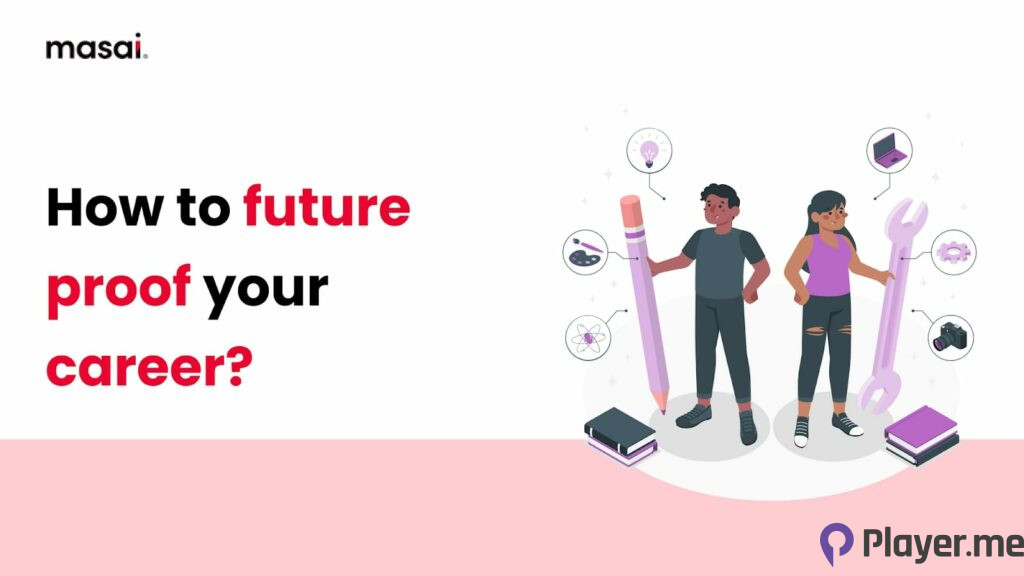Intelligent tools like ChatGPT have changed how workplaces work in the last few years. They help businesses do things faster and better, making work more efficient. But this change also makes some workers worry about what it means for their jobs.
If you’re feeling unsure about your job because of Artificial Intelligence (AI), don’t panic just yet. There are simple things you can do to handle this uncertainty. Instead of thinking AI will take your job, think of it as a tool you can use to be better at your job and future-proof your career. This guide will show you easy steps to do just that. It’s about using AI to your advantage and improving your skills with the new changes.
Remember, the key is not to resist technological advancements but to leverage them to enhance your capabilities and future-proof your career. By embracing a strategic approach that involves upskilling, soft skill development, and a mindset of continuous learning, individuals can weather the technological storm and thrive in the face of unprecedented change.
Also Read: IMF Chief Kristalina Georgieva States That AI Impact on Jobs Will Be Almost 40% Worldwide
8 Social Skills to Future-Proof Your Career

#1. Use AI to Your Advantage
AI can efficiently handle scheduling, time management, and data analysis tasks. And in your free time, you can focus on tasks that require a more nuanced human touch. By incorporating AI into your workflow, you make your daily routine more efficient and position yourself as someone with a comprehensive understanding of the tools shaping the future of work.
This familiarity can give you a competitive edge over colleagues who might need to be more adept at integrating AI into their responsibilities. Furthermore, actively seeking opportunities to incorporate AI tools into your work processes can make your role more essential, showcasing your adaptability and tech-savvy approach.
#2. Master ChatGPT Prompts

Effectively utilising tools like ChatGPT involves understanding the intricacies of crafting prompts. The quality of the chatbot’s response depends on the input it receives. To make the most of this technology, it’s crucial to use neutral and objective language in your prompts to avoid influencing the response with subjective biases.
Being specific is vital – The more details, context, and examples you provide in your prompts, the more accurate and valuable the chatbot’s output will be. By mastering the art of prompts, you not only enhance your productivity by receiving more relevant and precise information but also position yourself as someone who can effectively navigate and maximise the potential of AI tools in the workplace.
Read More: Top 10 Must-Try ChatGPT Features to Empower Your 2024 Experience!
#3. Create a Custom GPT for Your Company
The recent launch of the GPT store by OpenAI provides an opportunity for individuals to create and profit from their own custom GPT. Building a custom GPT for your company showcases your expertise and creativity in applying AI technology to address unique challenges within your workplace.
Such custom GPTs can serve as internal resource centres, quickly answer company-focused queries, or handle external customer inquiries. The process is designed to be accessible, requiring minimal coding expertise and the investment of around 15 minutes to create a custom GPT. By taking this step, you future-proof your career and actively contribute to technological evolution.
#4. Become a Research Pro

While AI tools like ChatGPT can be valuable in the research process, it’s essential to recognise their limitations. The chatbot’s responses are based on pre-existing data up to a certain point in time, making it crucial to supplement this information with various sources.
A comprehensive approach involves utilising various channels, from online blogs to academic journals, to ensure your research is up-to-date and well-rounded. Additionally, fact-checking responses received from chatbots is a prudent step to avoid relying entirely on automated systems.
#5. Hone Your Emotional Intelligence

Amidst the rise of AI, one human skill remains irreplaceable – Emotional Intelligence (EI). This quality encompasses understanding and connecting with others emotionally, contributing to effective communication, collaboration, and overall workplace dynamics.
Developing emotional intelligence involves adaptability to unpredictable situations, building solid relationships with colleagues, and navigating interpersonal challenges with empathy. A high level of EI sets you apart as a valuable team member and positions you as someone who brings a unique and indispensable skill to the workplace.
#6. Develop Your Creativity
Creativity stands as a distinct human trait that AI struggles to replicate. In a world increasingly influenced by technology, the ability to generate original ideas and think creatively becomes a valuable asset. Demonstrating creativity in your job involves actively participating in brainstorming sessions, reassessing established processes with an innovative mindset, and showcasing an openness to new ideas.
By emphasising your creative abilities, you make yourself less susceptible to automation and contribute to the dynamic and inventive aspects of your work environment. Creativity is not confined to artistic roles; It’s a quality that can be showcased in problem-solving, strategic thinking, and adapting to change – all highly valued in the age of AI.
Quick Link: A Comparative Analysis: Quantum AI vs. Classical AI
#7. Work on Your Personal Brand
In a landscape where AI can perform diverse tasks, establishing a personal brand becomes a strategic move to set yourself apart. AI may be a jack of all trades, but it is not a master of expertise, knowledge, and influence – Qualities that define industry leaders.
Building a personal brand is not a solo endeavour; it involves connecting with like-minded professionals, building a network, and actively participating in industry discussions. By doing so, you safeguard your position in the current job landscape and position yourself as a recognised and influential figure in your industry.
#8. Diversify Your Skillset

As the job market continues to evolve with the influence of AI, diversifying your skill set becomes a proactive strategy to stay ahead of the curve. Human-centric skills such as creativity, critical thinking, and problem-solving are increasingly valued in the age of automation.
These skills complement AI and contribute to areas where machines need more human intuition and ingenuity. Beyond human-centric skills, improving digital literacy becomes essential as technology becomes integral to various industries. Digital literacy involves understanding and effectively utilising digital tools, platforms, and data.
Future-Proof Your Career with These Skills
These eight steps serve as a comprehensive guide for individuals seeking to protect their current jobs and thrive in the evolving professional landscape. Embracing AI as a complementary tool rather than a threat, mastering its intricacies, and actively participating in its integration showcase a proactive approach.
In essence, these steps not only future-proof your career against the encroachment of automation but also empower individuals to actively shape their roles in an AI-dominated era actively. Here, you’ll find all the latest news articles related to AI and tech.
Author Profile
Latest entries
 GAMING2024.06.12Top 4 Female Tekken 8 Fighters to Obliterate Your Opponents in Style!
GAMING2024.06.12Top 4 Female Tekken 8 Fighters to Obliterate Your Opponents in Style! NEWS2024.03.18Elon Musk’s SpaceX Ventures into National Security to Empower Spy Satellite Network for U.S.
NEWS2024.03.18Elon Musk’s SpaceX Ventures into National Security to Empower Spy Satellite Network for U.S. GAMING2024.03.17PS Plus: 7 New Games for March and Beyond
GAMING2024.03.17PS Plus: 7 New Games for March and Beyond GAMING2024.03.17Last Epoch Necromancer Builds: All You Need To Know About It
GAMING2024.03.17Last Epoch Necromancer Builds: All You Need To Know About It





